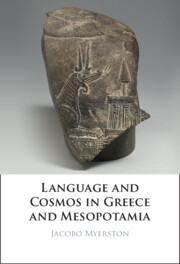Book contents
- Language and Cosmos in Greece and Mesopotamia
- Language and Cosmos in Greece and Mesopotamia
- Copyright page
- Dedication
- Contents
- Tables
- Acknowledgements
- Abbreviations
- Introduction
- 1 Babylonian Theories of Language
- 2 Language and Cosmos in the Epic of Creation
- 3 Hesiod, Language, and the Names of Ishtar
- 4 Orpheus’ Cosmic Names
- Conclusion
- Bibliography
- Index
Introduction
Published online by Cambridge University Press: 16 May 2023
- Language and Cosmos in Greece and Mesopotamia
- Language and Cosmos in Greece and Mesopotamia
- Copyright page
- Dedication
- Contents
- Tables
- Acknowledgements
- Abbreviations
- Introduction
- 1 Babylonian Theories of Language
- 2 Language and Cosmos in the Epic of Creation
- 3 Hesiod, Language, and the Names of Ishtar
- 4 Orpheus’ Cosmic Names
- Conclusion
- Bibliography
- Index
Summary
Extraordinary individuals in ancient Greece claimed to know the real meaning of names. They understood "real meaning" to be the theological and cosmological truths hidden in language. Although the truths were plural and there was no consensus about what true names ultimately reveal, the theoretical assumptions of those individuals were essentially similar: they believed that language in general, but more specifically the names of the gods, contained crucial information about the cosmos. Classicists tend to think that those views were already present in archaic hexametric poetry and further developed centuries later by philosophers, sophists, and religious innovators of the sixth and fifth centuries BCE. But did Greek philosophies of language and the semantics of divine names effectively develop in isolation? The present book explores points of contact between Greek and Mesopotamian systems of thinking about language and reality and argues for the importance of bringing into a dialogue cuneiform and Greek texts concerned with the cosmic function of language.
Keywords
- Type
- Chapter
- Information
- Language and Cosmos in Greece and Mesopotamia , pp. 1 - 14Publisher: Cambridge University PressPrint publication year: 2023

